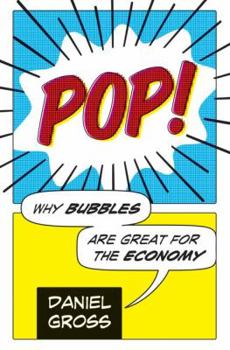Pop!: Why Bubbles Are Great for the Economy
Select Format
Select Condition 
Book Overview
Bubbles--from hot stocks in the 1920s to hot stocks in the 1990s--are much-lamented features of contemporary economic life. Time and again, American investors, seduced by the lures of quick money, new technologies, and excessive optimism, have shown a tendency to get carried away. Time and again, they have appeared foolish when the bubble burst. The history of finance is filled with tragic tales of shattered dreams, bankruptcies, and bitter recriminations...
Format:Hardcover
Language:English
ISBN:0061151548
ISBN13:9780061151545
Release Date:May 2007
Publisher:Harper Business
Length:240 Pages
Weight:0.76 lbs.
Dimensions:0.8" x 5.3" x 8.0"
Related Subjects
Business Business & Investing Economic History Economics Investing Popular EconomicsCustomer Reviews
1 rating
"Common knowledge" so often forgotten until the next pop!
Published by Thriftbooks.com User , 16 years ago
The premise quoting Gross: "...the tales of short-term woe experienced by bubble-burned investors, who constitute a minority of the population, frequently overlook the substantial long-term benefits that accrue to everyone, and the economy at large, in the years after. And if you take the long view - in this case, a pretty long view - it's possible to detect a pattern that emerges in bubbles and their aftermaths." Quoting elsewhere, "And this is not to say that all bubbles are good for the economy. ... To repeat, they're useful only when they leave behind a commercial infrastructure that others can use." Indeed, infrastructure remains along with burned investors. Gross then goes through many examples: telegraph, railroads, financial new deal, internet, real estate, and alternative energy. In his conclusion, prices of commodities and raw materials are generally leading indicators of a coming bubble and pop (his first of six rules). Note this review is written in the aftermath of the housing bust and ensuing credit crunch at a time when commodity prices have risen. What's the next bubble and pop? One can only tell after it's happened. During boom times, there's no end in sight. During busts, there's no end in sight. Why is this? Two other books may help answer that by looking at how we behave: Your Money and Your Brain: How the New Science of Neuroeconomics Can Help Make You Rich by Jason Zweig. Predictably Irrational: The Hidden Forces That Shape Our Decisions by Dan Ariely. Global demand is intertwined with human behavior. There are a few annoyances mentioned by other reviewers - however, the message is more important than the delivery; a message often forgotten - until next time. A message many in business have studied through business cycles - and forgotten - until next time. We as humans do this to ourselves - greed - both on the part of the investor piling in capital, and the company/industry romancing the capital to build their promises. Both get burned in the pop, and blame someone else. However, in the long run, society benefits. Then we do it again somewhere else "where it's going to be different this time." Wealth Odyssey: The Essential Road Map For Your Financial Journey Where Is It You Are Really Trying To Go With Money?






